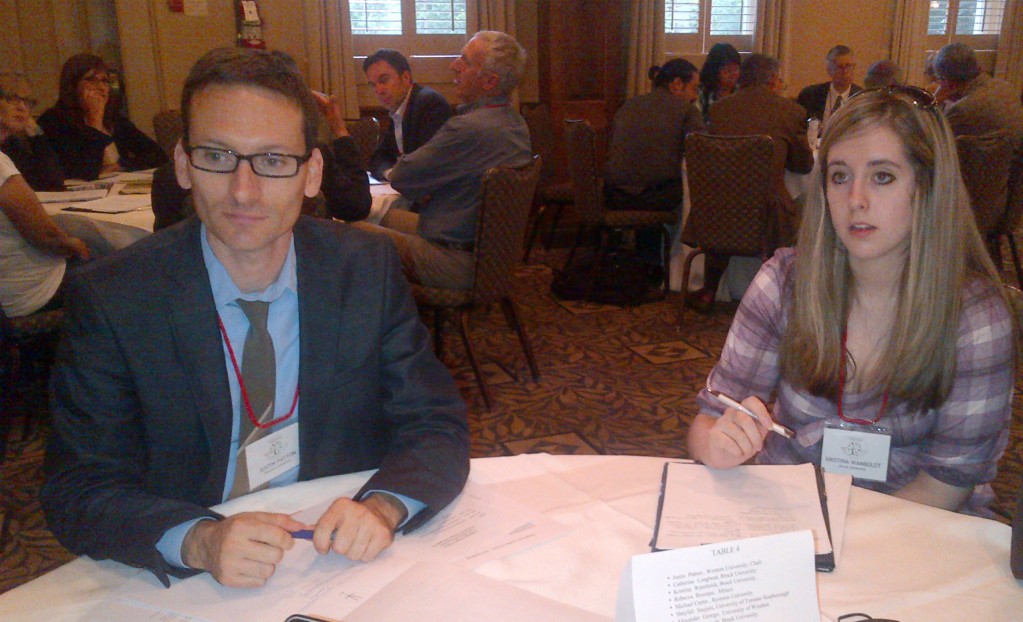 Student Kristina Wamboldt (right) was one of several representatives from Brock University at a recent meeting in Niagara-on-the-Lake of social sciences and humanities researchers from different universities and agencies.
Student Kristina Wamboldt (right) was one of several representatives from Brock University at a recent meeting in Niagara-on-the-Lake of social sciences and humanities researchers from different universities and agencies.
Student Kristina Wamboldt (right) was one of several representatives from Brock University at a recent meeting in Niagara-on-the-Lake of social sciences and humanities researchers from different universities and agencies.
What will you look like in 2030? What will Canada look like? What will be your – and your fellow Canadians’ – needs, trends, aspirations that researchers will aim to address?
Representatives from six southern Ontario universities, advocacy groups and the private sector hashed out these and other questions at the one-day “Imagining Canada’s Future” meeting in Niagara-on-the-Lake Sept. 21.
“The future is all about ideas,” Gary Libben, Brock’s Vice-President of Research, told the gathering. “And knowledge created within the social sciences and humanities is key to building the future for the young people in this room.”
Organized and hosted by Brock University, the meeting is part of a process to advise the Social Sciences and Humanities Research Council (SSHRC) on future research priorities.
Participants expressed a wide array of worries about the future: Canada’s rapidly-depleting natural resource base, the increase of foreign control over these natural resources, sustaining a delicate health-care system, invasion of privacy through technology, and the destruction of the environment.
That last point is especially urgent for Brock University Aboriginal PhD student Catherine Longboat.
“Just last week I saw little trees – piles and piles of these little trees, whereas before on the logging trucks there were maybe 10 big trees,” she said.
“I see clear-cutting on traditional lands. They (my community) already had a lot of understanding about why the trees had to be there in order to keep the water. And now I see the water levels are very low.”
But out of these various concerns arose trends for the future.
For Brock student Kristina Wamboldt, it’s going beyond a chalk-and-chalkboard approach in the classroom.
“Technology really allows you the opportunity to hit those different types of learners at their strong points,” Wamboldt said. “Visual learners can see something happening on a YouTube video.
“And then there’s the auditory learners. Teachers can give their instructions over the Internet so the students can listen to it again at home to jog their memory while they’re doing their practice work. Also, there are computer games that can be used in multiple subjects.”
Besides advising SSHRC on future research trends, the meeting aimed to address an even more fundamental challenge: the need for investment in social science and humanities research.
University of Guelph’s vice-president of research Kevin Hall says that for him, a holistic view of what constitutes “quality of life” is what counts.
“It’s not all about technology improving the quality of life, it’s about understanding our social systems, looking at health prevention, health policy, fine and performing arts, all these things enhance our life,” Hall said.
Many of the participants noted a bias in society favouring medical, technological or other natural sciences research.
“There’s no question that without social science and humanities research, much of the other research that we do has no real impact,” said Wendy Cukier Ryerson University’s vice-president of research and innovation.
“If you think about technological innovation, that depends not just on inventing technology, but on using those technologies appropriately, developing markets for those technologies, understanding how users will interact with the technologies.”
SSHRC is the federal agency that disperses grants for research in the humanities and social sciences at the post-secondary level. In the 2010-2011 funding year, the value of all grants, fellowships, and scholarships supported totaled $332.4 million.
In 2011 – 2012, the federal funding agency awarded $1.4 million in grants to 76 Brock University researchers.








